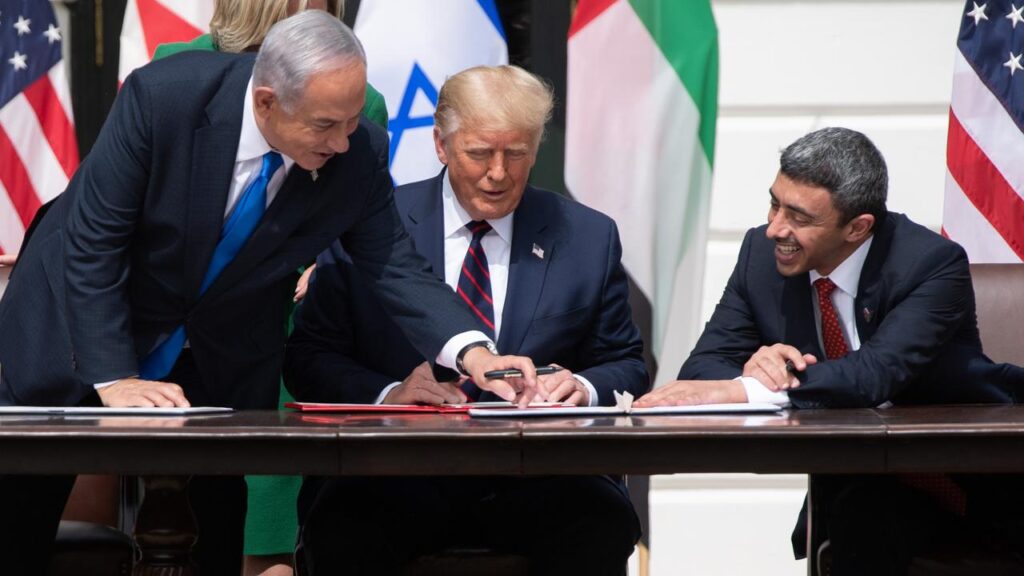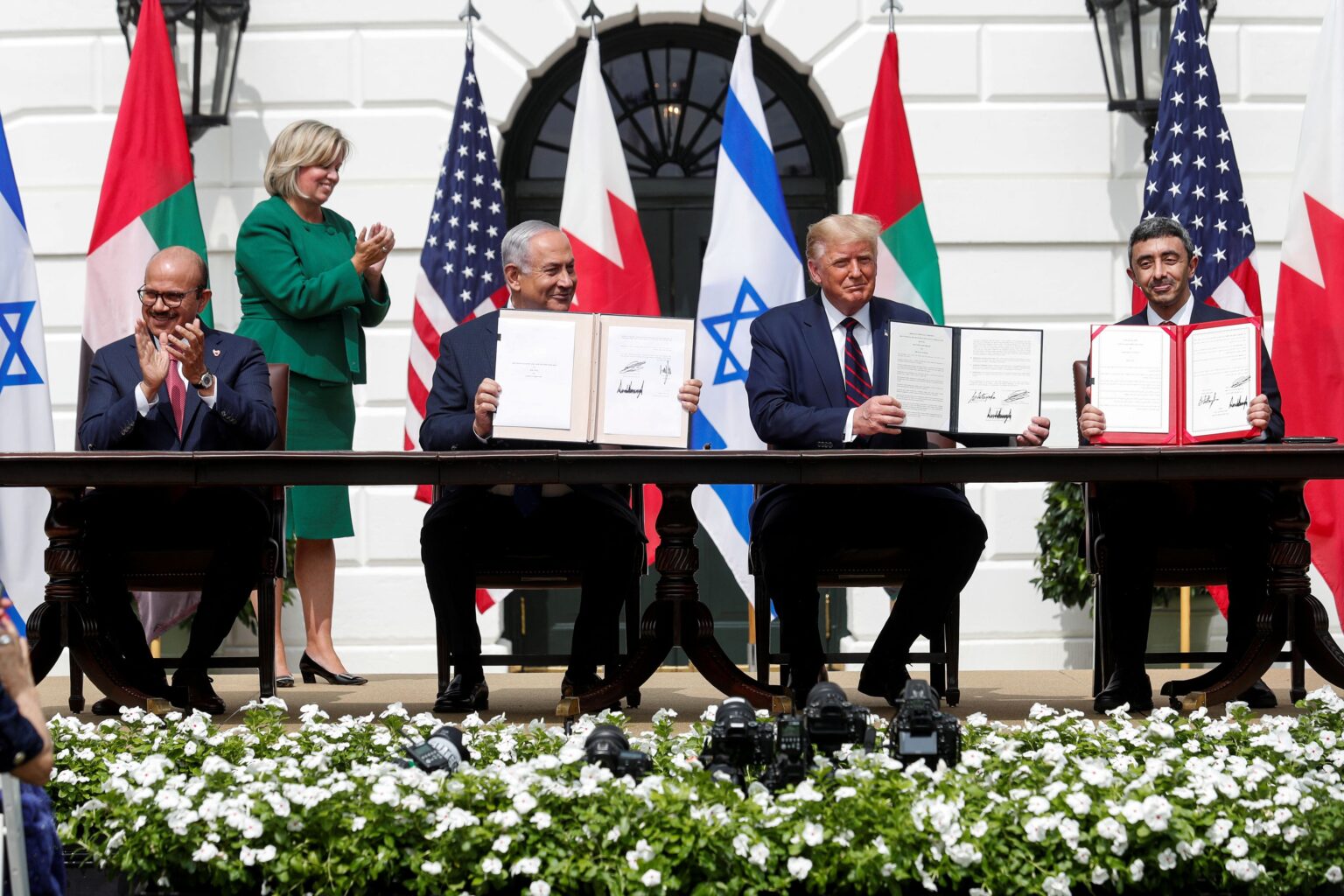Introduction
Middle Eastern countries formal Israel ties. That is the bold vision former U.S. President Donald Trump is now championing. In a statement earlier this month, Trump said he wants every country in the Middle East to establish formal diplomatic relations with Israel. His call comes at a time of heightened regional tensions, humanitarian crises, and shifting international alliances.
This renewed push for expanding the Abraham Accords—the normalization agreements Trump brokered during his presidency—has stirred debates about whether peace in the Middle East can truly be achieved through wider recognition of Israel, or if the unresolved Palestinian issue will continue to stand as the greatest obstacle.
The Abraham Accords: A Turning Point in Middle East Diplomacy
The Abraham Accords were signed in 2020 between Israel, the United Arab Emirates, and Bahrain, with Sudan and Morocco joining later. They represented a landmark shift in the Arab world’s policy toward Israel. For decades, most Arab states had refused to recognize Israel without a resolution to the Palestinian conflict.
By normalizing relations, these countries opened the door to trade, tourism, technology cooperation, and defense partnerships with Israel. The accords were hailed by the Trump administration as a historic achievement, breaking a decades-old stalemate.
Before 2020, only Egypt (1979) and Jordan (1994) had signed peace treaties with Israel. The accords doubled the number of Arab states with formal ties to Israel in just a few months.
However, critics noted that the deals bypassed the Palestinian issue. Palestinians described the accords as a betrayal, arguing that Arab solidarity with their struggle was being traded for economic and security benefits.

Trump’s Latest Call for Expansion
In early August 2025, Trump took to social media to restate his ambition. He declared that now, following U.S. military action that he claims destroyed Iran’s nuclear arsenal, it is time for all Middle Eastern countries to join the Abraham Accords. According to Trump, this expansion is the only way to ensure lasting peace in the region.
His words were blunt: “Now that the nuclear arsenal being created by Iran has been totally obliterated, it is very important to me that all Middle Eastern Countries join the Abraham Accords. This will ensure peace in the Middle East.”
Trump’s message also highlighted ongoing discussions with countries beyond the Middle East, including Azerbaijan and some Central Asian states, signaling that the accords could extend far beyond their original scope.
Why Push for Middle Eastern Countries to Formalize Israel Ties Now?
Several factors explain the timing of Trump’s call.
- Iran and Security Concerns
Trump linked his appeal to the U.S. military strikes on Iran, presenting them as a turning point. By portraying Iran’s nuclear program as neutralized, he framed normalization with Israel as the next logical step toward regional stability. - Shifting Global Diplomacy
International recognition of a Palestinian state has been gaining momentum, with many countries pushing for a two-state solution. Trump’s administration opposes this, instead emphasizing state-to-state agreements with Israel as the best path to peace. - Domestic Politics
Trump has always seen the Abraham Accords as one of his major foreign policy achievements. Renewing focus on them allows him to showcase leadership on Middle East peace as he seeks to bolster his legacy.
Obstacles to Normalization
While the Abraham Accords marked progress, expanding them across the entire Middle East is a far more complicated task.
- Saudi Arabia’s Reluctance
Saudi Arabia is the region’s most influential Arab nation and has long been seen as the key prize for Israel. But Riyadh has consistently tied normalization to the 2002 Arab Peace Initiative, which calls for a Palestinian state with East Jerusalem as its capital before relations can be established. - The Gaza War
The ongoing war in Gaza, which has left tens of thousands dead and devastated the enclave, has hardened opposition to Israel across the Arab world. Public sentiment in many countries is strongly against normalization, even when governments maintain quiet ties with Israel. - Arab Public Opinion
Surveys show that normalization is deeply unpopular among ordinary citizens. Many see it as legitimizing Israel’s treatment of Palestinians while ignoring their demands for statehood and human rights.
Potential Benefits of Formal Israel Ties
Supporters of Trump’s vision argue that normalization could bring significant advantages for both Israel and Arab countries.
- Economic Growth
Trade and investment opportunities have already expanded between Israel and the UAE since the accords. Tourism has grown, and joint ventures in technology and energy have been launched. Extending this model to other countries could bring billions of dollars in new economic activity. - Security Cooperation
Israel shares intelligence and defense technologies with its Abraham Accord partners. In a volatile region, many governments see closer ties with Israel as a way to counter threats from groups backed by Iran. - Changing the Peace Narrative
Instead of framing peace as dependent solely on solving the Israeli-Palestinian conflict, the accords promote a vision of pragmatic cooperation. Proponents believe that normalizing ties with Israel may eventually create conditions that help, rather than hinder, a Palestinian solution.
Regional Reactions
Some countries have shown interest in joining, though progress has been cautious. Talks with Azerbaijan and Central Asian states are underway, while Gulf nations remain divided.
Saudi Arabia continues to insist on Palestinian statehood as a prerequisite. Meanwhile, countries like Kuwait and Qatar remain opposed, emphasizing their solidarity with the Palestinian cause.
Other states may quietly deepen cooperation with Israel in areas such as security and trade without making it official, to avoid domestic backlash.
The Palestinian Question
Perhaps the biggest obstacle remains the question of Palestine. Without addressing Palestinian rights, experts warn that expanding the Abraham Accords may deepen divisions rather than resolve them.
Palestinians argue that normalization sidelines their cause and weakens their negotiating power. Many feel abandoned by Arab states that once conditioned recognition of Israel on progress toward Palestinian independence.
International pressure for a two-state solution is growing, yet the U.S. administration remains firm in opposing unilateral recognition of Palestine. This tension between global sentiment and U.S. policy could complicate Trump’s push for broader normalization.
Looking Ahead: Is Trump’s Vision Realistic?
The idea of Middle Eastern countries formal Israel ties is ambitious but faces enormous challenges. On paper, broader normalization could foster economic development, regional security, and a new diplomatic order. In reality, the political and humanitarian obstacles—particularly the Gaza crisis and the unresolved Palestinian issue—make sweeping agreements unlikely in the short term.
Some analysts suggest that incremental steps may be more achievable. Countries could build informal partnerships with Israel in trade, technology, or defense while leaving political recognition for later. Others argue that without a fair settlement for Palestinians, normalization will lack legitimacy and stability.
Conclusion
Middle Eastern countries formal Israel ties is a goal Trump insists could secure lasting peace. Yet while the Abraham Accords represented a historic diplomatic breakthrough, expanding them to every country in the region is far from guaranteed.
Saudi Arabia’s stance, the war in Gaza, and strong public opposition in Arab societies all stand as major roadblocks. Still, the potential rewards—economic growth, enhanced security, and a reshaped geopolitical map—ensure that normalization will remain a central issue in Middle East diplomacy.
Whether Trump’s vision becomes reality or remains an unfulfilled ambition depends on how the region navigates the delicate balance between strategic interests and the demand for justice and statehood for Palestinians.
Read Move: Oman Air Undergoes Major Employee Restructuring to Improve Efficiency



